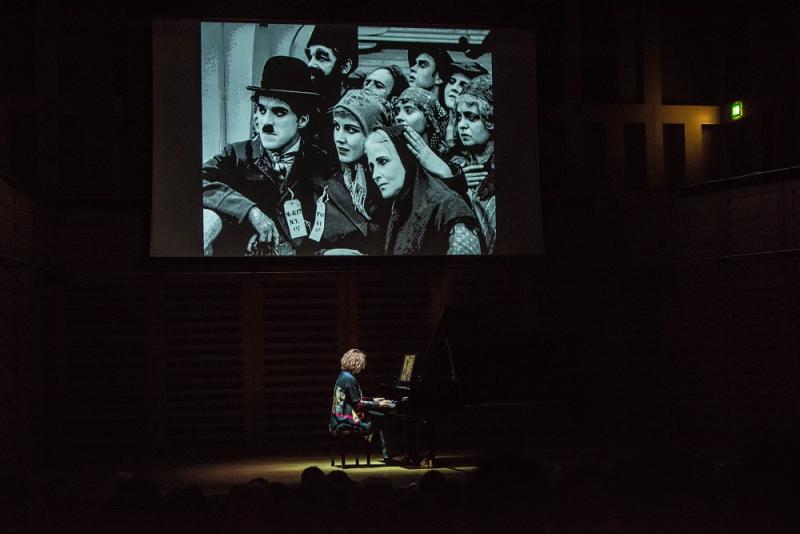Gabriela Montero, Kings Place review - improvising to a Chaplin classic is the icing on a zesty cake | reviews, news & interviews
Gabriela Montero, Kings Place review - improvising to a Chaplin classic is the icing on a zesty cake
Gabriela Montero, Kings Place review - improvising to a Chaplin classic is the icing on a zesty cake
Grabbing the audience and never letting go at the start of the London Piano Festival

As the Statue of Liberty appears in Charlie Chaplin’s The Immigrant, our improvising pianist proclaims “The Star-Spangled Banner”, only for it to slide dangerously.
But even without the connection to those composers and to another later émigré who ended up in Hollywood, Stravinsky, this would have been an unforgettable recital. The sheer acerbic ferocity of the Sarcasms, and their uncertain after-ponderings, where as Prokofiev put it “the laughter rings in our ears, laughing now at us”, could have been composed yesterday as Montero delivered these violently shifting moods. The five helter-skelter rides were not only interconnected but joined to the mostly less radical Second Piano Sonata composed in 1912, the same year as the Sarcasms were begun: a compellingly clear journey, beautifully shaped, with more room for sombre reflection, its tarantella finale with its scintillating chains of triads never more brilliantly delivered.
 Montero did seem to be playing to a bigger hall; while everything was right about the extremes in Prokofiev, at times there could have been more lightness of touch in the Second Piano Sonata which Rachmaninov so masterfully abridged in 1931 (some pianists still opt for the original, or even a hybrid of 1913 and 1931, but in this context the telescoping sat well alongside Prokofiev). The lovely elastic downward meditation which, in the revision, returns at the heart of the central Lento, though, was perfectly free. Any potential rigidity in the moto perpetuo outer movements of Stravinsky’s 1924 Sonata was magically dissolved by the subtlest of pauses and thoughtful articulation; what a wonderfully discombobulating little masterpiece this is.
Montero did seem to be playing to a bigger hall; while everything was right about the extremes in Prokofiev, at times there could have been more lightness of touch in the Second Piano Sonata which Rachmaninov so masterfully abridged in 1931 (some pianists still opt for the original, or even a hybrid of 1913 and 1931, but in this context the telescoping sat well alongside Prokofiev). The lovely elastic downward meditation which, in the revision, returns at the heart of the central Lento, though, was perfectly free. Any potential rigidity in the moto perpetuo outer movements of Stravinsky’s 1924 Sonata was magically dissolved by the subtlest of pauses and thoughtful articulation; what a wonderfully discombobulating little masterpiece this is.
The immigrant has telling background information in Montero's note, quoted in the programme, where she observes that he uses '"infinite shades of light and dark...When filming started in 1917, the US Immigrant Act had just been passed, restricting the entry of 'undesirables' – people from Asia and the illiterate – so the issue was very real" (and still is, need one add). She charmingly prefaced the film last night by telling us that she hadn’t looked at it since her last performance before lockdown, so who knew what might come out? Pure genius, as it happened, a level of non-stop imagination which even the best silent-movie pianists I’ve witnessed couldn’t match.
Propulsive ragtimes, woozy slidings for our hero on the rocking ship, pathos for the love-interest - Edna Purviance, so modern-looking in her beauty - and then just when you’d almost forgotten what had gone before in the programme, those skilful references to Prokofiev and Rachmaninov as Ellis Island approaches (plus the slyest, most fleeting of references to the Lohengrin Wedding March as our hero and his new love stand outside the registry office in the pouring rain).
If Montero’s fifth offering had been another 20th century work, this would still have been a recital holding us in thrall from first to last; the improvisation took it to spectacular heights. But the film accompaniment is what could bring many more younger people to a recital. Next, please, Ms Montero, the same treatment for a little Russian masterpiece, Pudovkin’s 1925 half-hour Chess Fever. I promise I won’t horrify an audience with my own crazy wish to play to it if you do so instead.
rating
Share this article
The future of Arts Journalism
You can stop theartsdesk.com closing!
We urgently need financing to survive. Our fundraising drive has thus far raised £49,000 but we need to reach £100,000 or we will be forced to close. Please contribute here: https://gofund.me/c3f6033d
And if you can forward this information to anyone who might assist, we’d be grateful.

Subscribe to theartsdesk.com
Thank you for continuing to read our work on theartsdesk.com. For unlimited access to every article in its entirety, including our archive of more than 15,000 pieces, we're asking for £5 per month or £40 per year. We feel it's a very good deal, and hope you do too.
To take a subscription now simply click here.
And if you're looking for that extra gift for a friend or family member, why not treat them to a theartsdesk.com gift subscription?

Add comment